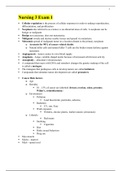Study guide
LCSW_flash_cards
- Kurs
- Hochschule
The seat of primitive drives and instinctual needs.
[ Mehr anzeigen ]vorschau 1 aus 29 Seiten
Vorschau 1 aus 29 Seiten
Einige Beispiele aus dieser Reihe der Übungsfragen
1.
What are the properties of the Id? Define the Ego. What are the properties of the Ego? Define the Superego. What are the properties of the Superego? What are the three levels of the mind? What does the \"Unconscious\" hold? What does the \"Preconscious\" hold? What does the \"Conscious\" hold? How many psychosexual stages did Freud describe and what are they? At what ages does Freud\'s \"Oral\" psychosexual stage occur? At what ages does Freud\'s \"Anal\" psychosexual stage occur? At what ages does Freud\'s \"Phallic/Oedipal\" psychosexual stage occur? At what ages does Freud\'s \"Latency\" psychosexual stage occur? At what ages does Freud\'s \"Puberty-Genital\" psychosexual stage occur?
Antwort: IMPULSES (impulsive behavior) SELF-GRATIFICATION Primary process thinking Unconscious Discharges tension Mediates drives (id) and external reality. Moderates drives vs internalized prohibitions Adaptive capacity in relation to external reality. REALITY TESTING OBJECT RELATIONS Judgment Modulating and controlling impulses Modulating affect Regulate self-esteem Mastering developmental challenges Seat of Conscience Ego Ideal Guilt (if too strong = always guilty) Uses internal and external rewards or punishments to control and regulate id impulses. Unconscious Preconscious Conscious Thoughts, feelings, desires, and memories of which we are unaware. Thoughts and feelings, which can be brought into consciousness easily. Mental activities of which we are fully aware. 5 Stages: 1. Oral 2. Anal 3. Phallic/Oedipal 4. Latency 5. Puberty-Genital 0-1 2-3 3-6 6-11 12-18 Adolescense
2.
Name Erikson\'s 8 Psychosocial Stages in the lifecycle. Briefly explain Erikson\'s first stage: Trust vs. Mistrust. Briefly explain Erikson\'s second stage: Autonomy vs Shame & Doubt. Briefly explain Erikson\'s third stage: Initiative vs Guilt. Briefly explain Erikson\'s fourth stage: Industry vs Inferiority. Briefly explain Erikson\'s fifth stage: Identity vs Identity Diffusion. Briefly explain Erikson\'s sixth stage: Intimacy vs Isolation.
Antwort: 1. Trust vs Mistrust 2. Autonomy vs Shame & Doubt 3. Initiative vs Guilt 4. Industry vs Inferiority 5. Identity vs Identity Diffusion 6. Intimacy vs Isolation 7. Generativity vs Self-Absorption 8. Integrity vs Disgust Infancy (0-1) -build trust in self & environment -personality forms -discontinuities in care = sense of mistrust Early Childhood (2-3) -muscular maturation: holding on/letting go -attaches value to autonomous will -development of one\'s own will or shame and doubt Play Age (3-6) -imagination & ability to move & communicate expand -intrusive activity, curiosity, & fantasy = guilt & anxiety -One\'s conscious forms -may develop a deep seated conviction that he is bad = stifled initiative or vindictiveness School Age (6-11) -want to work/learn w/ others -learns to accept instruction -capacity for work enjoyment -No recognition for one\'s efforts = inadequacy and inferiority Adolescence (12-18) -puberty -questions \"all sameness & continuities relied on earlier\" -integrates childhood identifications w/ biological drives, endowments, and social role opportunities -possible development of negative identity towards becoming what parents, class, or community don\'t want them to be Young Adulthood (18-mid 20\'s) -security in oneself = intimacy with self & others -love-based mutually satisfying relationships -a person who cannot enter wholly into an intimate relationship b/c of fear of losing identity = isolation

Stuvia Verkäufer haben mehr als 700.000 Zusammenfassungen beurteilt. Deshalb weißt du dass du das beste Dokument kaufst.

Man bezahlt schnell und einfach mit iDeal, Kreditkarte oder Stuvia-Kredit für die Zusammenfassungen. Man braucht keine Mitgliedschaft.

Deine Mitstudenten schreiben die Zusammenfassungen. Deshalb enthalten die Zusammenfassungen immer aktuelle, zuverlässige und up-to-date Informationen. Damit kommst du schnell zum Kern der Sache.
Du erhältst eine PDF-Datei, die sofort nach dem Kauf verfügbar ist. Das gekaufte Dokument ist jederzeit, überall und unbegrenzt über dein Profil zugänglich.
Unsere Zufriedenheitsgarantie sorgt dafür, dass du immer eine Lernunterlage findest, die zu dir passt. Du füllst ein Formular aus und unser Kundendienstteam kümmert sich um den Rest.
Stuvia ist ein Marktplatz, du kaufst dieses Dokument also nicht von uns, sondern vom Verkäufer muturikenneth. Stuvia erleichtert die Zahlung an den Verkäufer.
Nein, du kaufst diese Zusammenfassung nur für 12,78 €. Du bist nach deinem Kauf an nichts gebunden.
4.6 Sterne auf Google & Trustpilot (+1000 reviews)
45.681 Zusammenfassungen wurden in den letzten 30 Tagen verkauft
Gegründet 2010, seit 14 Jahren die erste Adresse für Zusammenfassungen






